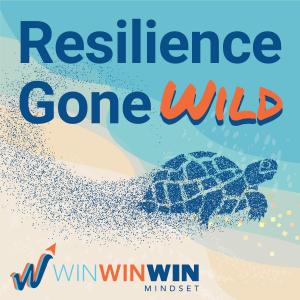Resilience Gone Wild (WinWinWin Mindset)

Parrotfish Master Sleep Part 2 – Animal Sleep Secrets with Dr. John Lesku (Episode 42)
In this fascinating episode of Resilience Gone Wild, host Jessica Morgenthal speaks with Dr. John Lesku, a leading sleep researcher, about the amazing patterns and processes of sleep in animals of all types —and what they can teach us about human health, resilience, and performance.
From parrotfish building mucus cocoons to sleep safely, to dolphins sleeping in with one eye and half brain alert, to penguins napping in microbursts, and birds sleeping mid-flight, this episode explores the incredible adaptations across species that allow sleep to happen in even the most challenging environments.
Lesku discusses the latest sleep science, including how pollution and urban noise disrupt wildlife sleep, how sleep deprivation impairs cognition in both animals and humans, and why sleep hygiene is vital for long-term wellness. Together, they make a compelling case for rethinking our relationship with rest, emphasizing that sleep is not a luxury—it's a biological necessity.
Takeaways:
Sleep is essential to survival and health, both for humans and animals.Sleep impacts cognitive function, emotional regulation, and decision-making.Sleep deprivation can be as impairing as intoxication.Many animals have unique sleep strategies, including unihemispheric sleep in cetaceans, birds and other animals.Parrotfish secrete a protective mucus cocoon as a natural sleep defense.Penguins and migratory birds thrive with fragmented or polyphasic sleep patterns.Urban wildlife adapt sleep to manage noise pollution and artificial light.Sensory gating helps humans and more-than-human animals selectively process information while asleep.Individual sleep needs vary, and there's no one-size-fits-all approach.Research on animal sleep can inform better human sleep practices and resilience strategies.Sound Bites:
“We need to pay more attention to a third of our life.”“Sleep is one of the main pillars of a healthy lifestyle.”“Sleep loss affects cognitive flexibility in animals.”“Animals have amazing adaptations to permit sleep.”“Light pollution halves the amount of sleep birds get.”“Protect your sleep—it’s essential for your well-being.”“Penguins get about 11 hours of sleep a night—in tiny increments.”Resources & Further Learning:
Dr. John Lesku – La Trobe UniversitySleep Ecophysiology Lab at La Trobe University (John Lesku's research lab)National Sleep Foundation – Sleep and HealthInternational Journal of Sleep ResearchNature and Sleep: How Wildlife RestKeywords:
sleep, animal sleep, sleep deprivation, sleep hygiene, cognitive effects, sleep research, parrotfish, marine mammals, sleep patterns, resilience, birds and sleep, sensory gating, urban wildlife, sleep in animals, penguins, migratory birds, one-hemisphere sleep, nature and rest, sleep and pollution
Connect With Us
Listen Now: https://pod.link/J4yd77
Share your thoughts with host Jessica Morgenthal: jessica@ResilienceGoneWIld.com
Explore More: Visit Resilience Gone Wild for show notes, photos, and resources: https://winwinwinmindset.com/the-resilience-gone-wild-podcast/
Produced by Balancing Life’s Issues (BLI Studios) in partnership with a WinWinWin Mindset.






 Visit Podcast Website
Visit Podcast Website RSS Podcast Feed
RSS Podcast Feed Subscribe
Subscribe
 Add to MyCast
Add to MyCast